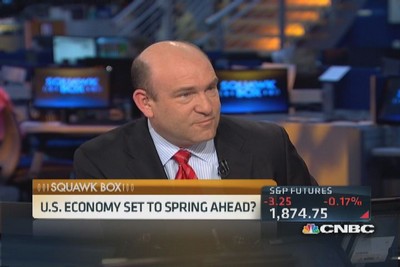US stock indexes end slightly lower on global-growth concerns
Monday, 10 Mar 2014 | 4:09 PM ET
By: Kate Gibson | Markets Writer
U.S. stocks fell on Monday, bringing the
S&P 500 down from its latest record, as a deceleration in China's
exports had investors fretting about the health of the global economy.
Wall Street's decline "is a reflection of what went on over in China; China's exports dropped pretty startling, and the Chinese are again dropping the value of their currency, which has investors worrying about the global recovery," said Chris Gaffney, a senior market strategist at EverBank. China's exports unexpectedly fell 18.1 percent last month versus expectations of a 6.8 percent climb.
"We're the largest destination for exports from China, so investors have started questioning what retail sales will look like this week. But the weather had to affect shoppers in February, so just like we had a built in cushion for the jobs number on Friday, we're got the weather excuse for retail sales," said Gaffney.
In a speech at the Bank of France, Philadelphia Fed President Charles Plosser said harsh weather likely curbed jobs growth in February, with Plosser the latest central banker to express the view that recent softness in the labor market might be temporary.
Wall Street's decline "is a reflection of what went on over in China; China's exports dropped pretty startling, and the Chinese are again dropping the value of their currency, which has investors worrying about the global recovery," said Chris Gaffney, a senior market strategist at EverBank. China's exports unexpectedly fell 18.1 percent last month versus expectations of a 6.8 percent climb.
"We're the largest destination for exports from China, so investors have started questioning what retail sales will look like this week. But the weather had to affect shoppers in February, so just like we had a built in cushion for the jobs number on Friday, we're got the weather excuse for retail sales," said Gaffney.
In a speech at the Bank of France, Philadelphia Fed President Charles Plosser said harsh weather likely curbed jobs growth in February, with Plosser the latest central banker to express the view that recent softness in the labor market might be temporary.
| Name | Price | Change | %Change | ||
|---|---|---|---|---|---|
| DJIA | Dow Jones Industrial Average | 16418.68 | -34.04 | -0.21% | |
| S&P 500 | S&P 500 Index | 1877.17 | -0.87 | -0.05% | |
| NASDAQ | Nasdaq Composite Index | 4334.45 | -1.77 | -0.04% |
After falling 118 points, the Dow Jones Industrial Average fell 34.04 points, or 0.2 percent, to 16,418.68, with Boeing the biggest blue-chip decliner. The plane maker on Friday said "hairline cracks" had been found in the wings of roughly 40 787 Dreamliners currently in production. Separately, a 777-200 plane vanished with 239 people aboard during a Malaysia Airlines flight to Beijing on Friday.
McDonald's shares also weighed on the Dow, after the fast-food chain reported a larger-than-expected decline in comparable global sales at established restaurants in February.
The S&P 500 fell nearly 1 point to 1,877.17, with industrials and consumer discretionary leading declines and health care and energy the best performing of its 10 major sectors.
The Nasdaq lost 1.77 point to 4,339.93.
The CBOE Volatility Index, otherwise know as the VIX, considered a gauge of investor uncertainty, rose 1 percent to 14.25.
The dollar rose against the currencies of major U.S. trading partners; the 10-year Treasury yield lost 1 basis point to 2.78 percent.
The standoff that has Russia trying to take control of Crimea from Ukraine is another potential drag on the stock market. Germany Chancellor Angela Merkel told Russian President Vladimir Putin on Sunday that a planned Moscow-supported referendum on whether Crimea should join Russia violated Ukraine's constitution.
"She (Merkel) did wrap their hand a little bit, but she has to be careful, because Europe gets a lot of their oil and natural resources from Russia," said EverBank's Gaffney.
Crude-oil futures fell $1.46, or 1.4 percent, to $101.12 a barrel; gold reversed losses, rising $3.30, or 0.2 percent, to $1,327.50 an ounce.
Stocks on Friday staged a mixed finish, with the S&P 500 ending at another record, as investors tracked the standoff in Ukraine and after February's jobs report indicated the harsh winter could be the culprit behind recent weakness in economic data.
Sunday was the five-year anniversary of the S&P's 12-year low of 77.53, when the economy was in its worst recession in seven decades.
(Read: Bull market still has some sizzle)
The standoff that has Russia trying to take control of Crimea from Ukraine is another potential drag on the stock market. Germany Chancellor Angela Merkel told Russian President Vladimir Putin on Sunday that a planned Moscow-supported referendum on whether Crimea should join Russia violated Ukraine's constitution.
"She (Merkel) did wrap their hand a little bit, but she has to be careful, because Europe gets a lot of their oil and natural resources from Russia," said EverBank's Gaffney.
Crude-oil futures fell $1.46, or 1.4 percent, to $101.12 a barrel; gold reversed losses, rising $3.30, or 0.2 percent, to $1,327.50 an ounce.
Stocks on Friday staged a mixed finish, with the S&P 500 ending at another record, as investors tracked the standoff in Ukraine and after February's jobs report indicated the harsh winter could be the culprit behind recent weakness in economic data.
Sunday was the five-year anniversary of the S&P's 12-year low of 77.53, when the economy was in its worst recession in seven decades.
(Read: Bull market still has some sizzle)













0 σχόλια:
Δημοσίευση σχολίου
Ο σχολιασμός επιτρέπεται μόνο σε εγγεγραμμένους χρήστες